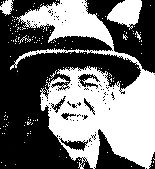
In fact, the Allies' position was too poor to negotiate. Their Western Front strategy was bankrupt. Into the Moloch of the Somme they had poured thousands upon thousands of lives while for three months under the autumn rains, forgotten in the planning, General Haig shouted, "Attack!" to men mired in the mud and shattered by exploding shells. By the end of November the offensive. was over, for a total gain in depth of seven miles and a total casualty list, on both sides, of one million. In December the Allies' new recruit, Rumania, surrendered, the Czarist regime was beginning to split at the seams and whispers of Russian readiness for a separate peace to seep through. On December 5 the dispirited Asquith government gave way to one headed by the militant Lloyd George, who would as soon negotiate as capitulate.
The facts would have forced themselves upon anyone but Wilson, but the armor of fixed purpose he wore was impenetrable. He chose two main principles --- neutrality for America and negotiated peace for Europe --- as the fixed points of his policy and would allow no realities to interfere with them. He no longer read the long, informative letters which Ambassador Page wrote him week after week from London, the nerve center of the war, because he considered Page hopelessly pro-Ally. Although no two men in any one period of history were more unlike, Wilson shared one characteristic with the Kaiser --- he would not listen to opinions he did not welcome. Wilhelm was afraid of them, but Wilson considered opinions which opposed his as simply a waste of time. Intent upon saving Europe, he ignored the mood of the Europeans. Just as he was determined to confer democracy upon Mexicans, ready or not, he was determined to confer peace upon Europeans, willing or not. He had no idea how like condescension his attitude appeared to them. He listened to himself rather than to them. He seemed unaware that two and a half years of fighting a war that was taking the best lives of nations had welded the combatants into a frame of mind in which compromise was impossible. He refused to recognize that each side by now wanted tangible gains to show that the pain and cost had been worth while, and each had aims --- Alsace-Lorraine was only one, but it would have been enough --- that were permanently ureconcilable.
Wilson could see only expanding violence. Turks were killing Armenians with a savagery that, if the facts were told, reported the American Ambassador, "would make men and women weep." Poland, trampled beneath the tremendous clash of armies, was a wasteland of wandering skeletons with snow falling and not a head of livestock or a stick of firewood left. Belgians were being shipped like cattle into Germany for slave labor. The belligerents after the Battle of the Somme were as helpless in the war's vortex as ever and as powerless to find a way out. Wilson saw the world caught in a berserk carnage endlessly continuing unless stopped by a disinterested outsider --- himself. The question of rights and wrongs he would not look at or professed, at this time, not to see. He recognized that a triumph of German militarism "would change the course of civilization and make the United States a military nation," but he believed that the way to prevent this disaster was not to join the Allies but to stop the war. He felt obliged to be, or at least to act, impartial if he was to have any chance of getting both sides to listen to him. He was convinced that only a negotiated peace could endure, that a dictated peace forced upon the loser "would be accepted in humiliation, under duress, at an intolerable sacrifice, and would leave a sting, a resentment, a bitter memory upon which the terms of peace would rest, not permanently, but only as upon quicksand."
"Only a peace between equals can last," a "peace without victory" --- this was the wisdom that made him great, but it was a long-distance wisdom that ignored realities underfoot. The combatants were in no mood for it. Shivering in trenches, in blood and mud and stench, they resented advice from a man in a far-off white mansion who said he was "too proud to fight." Wilson thought he saw the better path, but Europe would not take it. Had all the world been a school and Wilson its principal, he would have been the greatest statesman in history. But the world's governments and peoples were not children obliged to obey him. The world was a little group of willful men who would not and could not be made to behave as Wilson told them they ought to. He was a seer whose achievements never equaled his aims. In the few years left to him he was to become the symbol of the world's hope and of its failure. He was one of those few who formulate the goals for mankind, but he was in the impossible position of trying to function as seer and executive at the same time. He held political office and would not acknowledge that politics is the art of the possible. He obeyed the injunction that a man's reach should exceed his grasp; it was his tragedy that he reached too high.